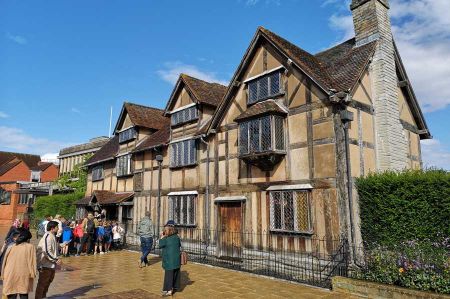Shakespeare’s - playwright, actor and businessman
- Written by Portal Editor
Understandably, we also wanted to use our stay in England near the medieval town of Stratford-upon-Avon to learn a little more about the author Shakespeare, because some of his works were still too good to remember in school and college.
And when you are around, it makes sense to do so.
So we made our way to Stratford on a rainy day, always hoping that the constant rain would stop, which was the case during the late morning. From a public parking lot, we walked into the city centre, where large groups of visitors were gathering, despite the rain: Shakespeare's birthplace was heavily frequented, mostly by visitors from Asia.
Shakespeare's birthplace, Stratford-upon-Avon
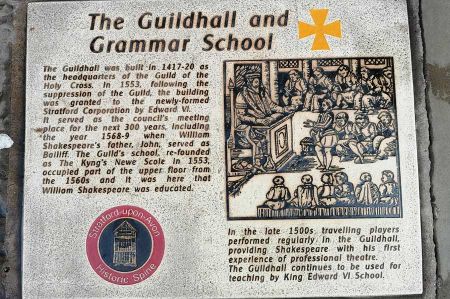 According to the Holy Trinity Church register in Stratford-upon-Avon, Warwickshire, Shakespeare was baptized on April 26, 1564, his exact date of birth is not known. April 23 has often been mentioned as his birthday since the 18th century, but this information is not guaranteed and is probably due since Shakespeare died on the same day in 1616 (April 23). Sometimes April 23rd is underpinned as Shakespeare's supposed birthday, by the claim that children were baptized three days after their birth in Elizabethan England; in fact, there was no such three-day usage.
According to the Holy Trinity Church register in Stratford-upon-Avon, Warwickshire, Shakespeare was baptized on April 26, 1564, his exact date of birth is not known. April 23 has often been mentioned as his birthday since the 18th century, but this information is not guaranteed and is probably due since Shakespeare died on the same day in 1616 (April 23). Sometimes April 23rd is underpinned as Shakespeare's supposed birthday, by the claim that children were baptized three days after their birth in Elizabethan England; in fact, there was no such three-day usage.
William Shakespeare's parents were John Shakespeare and Mary Arden, who came from a wealthy family. His father was a freelance landowner and brought it to the Oberaldermann in his town. But later his fortune decayed, and he lost his reputation due to his debts.
William Shakespeare probably attended grammar school in Stratford-upon-Avon, where he received lessons in Latin, Greek, history, morals, and poetry. The lessons of a grammar school imparted knowledge of rhetoric and poetics and instructed the students to produce small dramas based on the model of ancient models. There is no evidence that Shakespeare, like other contemporary English playwrights, attended university.
Marriage and family - a normal life?
At the age of 18, on November 30 or December 1, 1582, he married Anne Hathaway, the daughter of a large landowner eight years older. The date of the wedding is not known, but the marriage license report was ordered on November 27, 1582. The date of the call is documented by an entry in the register of the Diocese of Worcester regarding the granting of a license for the marriage of "Willelmum Shaxpere et Annam Whateley", although the spellings were subject to errors.
On November 28, 1582, a consortium of two friends was documented at the consistory of the aforementioned diocese in the considerable amount of £ 40 to receive a dispensation from the then prescribed three-time offer for the marriage of "Willm Shagspere" and Anne Hathwey of Stratford. This elaborate dispensing procedure was necessary so that the marriage could take place before the start of the Christmas season, since from the first day of Advent onwards, marriage ceremonies and weddings were no longer permitted under church law.
The daughter Susanna was born about six months after the marriage (baptized on May 26, 1583). Almost two years later, twins, the son Hamnet and daughter Judith, were born. The baptismal entry in the Church Book of Stratford on February 2, 1585 read: "Hamnet and Judith, son and daughter to William Shakespeare". Nothing is known about the relationship between the spouses and their children. There are no documents in this regard, which is not uncommon since all personal relationships in the middle class were generally not recorded in writing, neither in private letters nor in diaries that usually did not contain any personal records. Shakespeare's son Hamnet died in 1596 at the age of eleven (funeral August 11, 1596; cause of death unknown), whereas the two daughters survived childhood.
First recognized activities as a writer
The first written document to show that Shakespeare was a writer and author in London came from the poet Robert Greene, who defamed him in 1592 in a pamphlet as an upstart.
Greene blasphemed that Shakespeare's poems stand on a level like the prestigious poets of his time: there is an upstart Crow, beautified with our feathers, that with his Tygers hart wrap in a Players hide, supposes he is as well able to bombast out a blank verse as the best of you: and being an absolute Johannes fac totum, is in his own conceit the only Shake-scene in a country.
When the pamphlet was published posthumously, the editor apologized, which suggests that Shakespeare was already popular at the time and had influential patrons. At that time, he was already a member of the Lord Strange’s Men’s troupe, a large part of which formed in 1594 as the Lord Chamberlain’s Men and was one of the leading acting troops in London. Shortly after his accession to the throne, Jacob I made her his own as King’s Men.
First work published under the name William Shakespeare, 1593
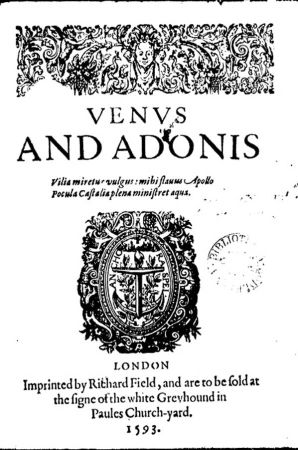 The theatre system that developed in the Elizabethan period was still unsecured and was subject to rapid, risky changes, but was also profitable under favourable conditions. However, this did not apply to the professional poet or playwright per se, who could not make a living from his work as an author, as numerous examples from this time show, from the standard fees for drama troops to which he sold his drama texts, to which he was normally entitled, since everyone Further rights of use were transferred to these theatre groups when the manuscript was handed over. The formerly respected existence and way of life of the professional poet and author under the patronage of a noble patron, whose literary work was rewarded by rich gifts or honorary awards, had largely been lost in Shakespeare's time.
The theatre system that developed in the Elizabethan period was still unsecured and was subject to rapid, risky changes, but was also profitable under favourable conditions. However, this did not apply to the professional poet or playwright per se, who could not make a living from his work as an author, as numerous examples from this time show, from the standard fees for drama troops to which he sold his drama texts, to which he was normally entitled, since everyone Further rights of use were transferred to these theatre groups when the manuscript was handed over. The formerly respected existence and way of life of the professional poet and author under the patronage of a noble patron, whose literary work was rewarded by rich gifts or honorary awards, had largely been lost in Shakespeare's time.
Against this historical background, Shakespeare wrote two short verses, Venus and Adonis (1593) and The Rape of Lucrece (1594), which he published himself, in contrast to all his other works, and with a signed dedication to Henry Wriothesley, the Earl of Southampton , failed. Since epic works at the time were associated with high literature, while theatre plays were assigned to commercial literature, Shakespeare probably called Venus and Adonis the first work ("first heir of my invention") for this reason. In this way, he not only achieved high esteem in the circles of literary connoisseurs and lovers, but was more often praised and mentioned by his contemporaries as the author of these epics than later for his most frequently discussed and praised tragedy Hamlet. With this he was able to initiate his literary career as well as a successful stage writer.
As early as the beginning of 1595, Shakespeare was one of the most recognized members of the Lord Chamberlain's Men, who shortly afterwards became the leading acting troupe, as can be seen from a traditional proof of payment from the Master of the Revels or the royal treasury for a special performance at the court on March 15, 1595 after the accession to the throne of Jacob I in 1603, placed under his patronage and thus raised to the service of the crown. Shakespeare's name, along with that of Richard Burbage and well-known actor William Kempe, appeared on a receipt for the receipt of ₤ 20 for two court performances by Lord Chamberlain's Men on behalf of the acting troupe, thereby documenting not only his full establishment within this acting group, but also his official authority to represent the force externally.
Shakespeare's Living Resources
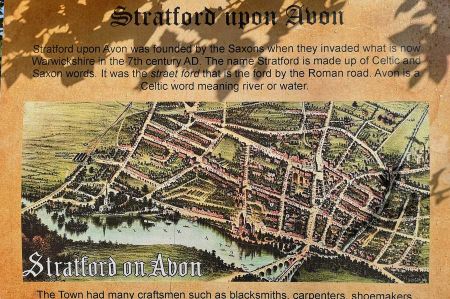 Shakespeare not only wrote a plethora of plays for his theatre troupe as their ancestral house dramatist but was also initially a co-owner (sharer) with a financial stake of 10% in their profits. He also played himself as an actor in smaller roles. The diary records, for example by the theatre entrepreneur Philip Henslowe, prove the financial merits of Shakespeare's plays; in contrast to many other contemporary stage authors, Shakespeare from now on achieved steady successes not only in professional or artistic terms, but increasingly in business and social terms.
Shakespeare not only wrote a plethora of plays for his theatre troupe as their ancestral house dramatist but was also initially a co-owner (sharer) with a financial stake of 10% in their profits. He also played himself as an actor in smaller roles. The diary records, for example by the theatre entrepreneur Philip Henslowe, prove the financial merits of Shakespeare's plays; in contrast to many other contemporary stage authors, Shakespeare from now on achieved steady successes not only in professional or artistic terms, but increasingly in business and social terms.
His acting troupe was very popular with the court as well as with the theatre audience of the large public theatres and earned accordingly. From 1596 onwards, it was possible to prove in detail that Shakespeare continuously invested money or invested in real estate. When Shakespeare's troupe moved the venue to the newly built Globe Theatre in 1599, James Burbage, whose family owned the old Globe Theatre, gave him a partnership of at least a tenth. Sometime later, this share rose to a seventh in 1608 when the Blackfriars was built as a second theatre primarily for performances in the winter season.
His greatest poetic competitor was initially Christopher Marlowe, later Ben Jonson. It was customary to rewrite older pieces and perform them again: Shakespeare's Hamlet, for example, could be the adaptation of an older "original Hamlet". Legendary and fairy tale material was sometimes processed into dramas several times, as in the case of King Lear. Pieces were also created based on printed sources, such as Plutarch's biographies of great men, Italian novel collections or chronicles of English history. Another common method was to write sequels to successful pieces. The figure of Falstaff in Henry IV was so popular with the audience that Shakespeare made it appear again in The Merry Wives of Windsor.
Poet and businessman
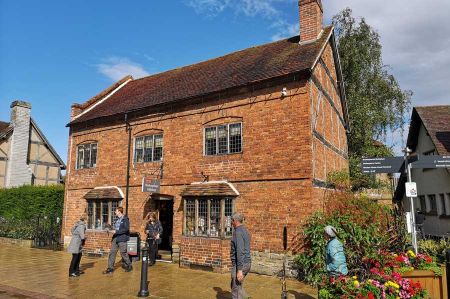 In addition to his dramatic works, Shakespeare also wrote lyrical and epic poems (presumably when the theatres in London had to close temporarily due to the plague epidemics). The latter established his reputation as an author among his contemporaries. In 1593 he wrote the two verses Venus and Adonis and Lucrece mentioned above. The subsequent publication of 154 sonnets in 1609 is surrounded by numerous puzzles. In a short publisher's opening credits, which is mostly read as "dedication", the only begetter and Mr. W. H. are mentioned; the identity of this person has not yet been established. Perhaps this sonnet publication is pirated.
In addition to his dramatic works, Shakespeare also wrote lyrical and epic poems (presumably when the theatres in London had to close temporarily due to the plague epidemics). The latter established his reputation as an author among his contemporaries. In 1593 he wrote the two verses Venus and Adonis and Lucrece mentioned above. The subsequent publication of 154 sonnets in 1609 is surrounded by numerous puzzles. In a short publisher's opening credits, which is mostly read as "dedication", the only begetter and Mr. W. H. are mentioned; the identity of this person has not yet been established. Perhaps this sonnet publication is pirated.
London, Shakespeare's Globe Theatre
As a co-owner of the London Globe Theatre that built his troupe to replace the theatre after its lease expired, Shakespeare was increasingly successful as a poet and businessman. The Lord Chamberlain’s Men, named after their patron and sponsor, also performed at Queen Elizabeth’s court. Under Elisabeth's successor Jakob I, they named themselves after their royal patron King’s Men.
As a partner in the Globe, Shakespeare acquired considerable fortune and great influence.
In addition to his commercial transactions in the theatre industry, Shakespeare was also active as a businessman and investor in numerous businesses outside the theatre company. He mainly invested his money in the purchase of real estate in his hometown of Stratford. So, on May 4, 1597 he bought New Place, the second largest house in the city, as his manor and on May 1, 1602 acquired 43 hectares (107 acres) of arable land along with forest and rights of use for common land. On September 28, 1602 he bought another house with land opposite his manor and on July 24, 1605 he acquired the right to collect part of the tithing income of various farmer leases at the price of ₤ 440, which earned him an annual net income of ₤ 40. Shakespeare not only invested the assets he had acquired, but also managed his new acquisitions and made further profits from them. He leased land or arable land, sold the building rubble to the community or collected outstanding debts through legal proceedings and also speculated with the hoarding of grain in addition to his participation in various community activities of the group of the group of large landowners. In London Shakespeare also bought a house with a shop in the immediate vicinity of the Blackfriars Theatre.
The businessman Shakespeare renounces fame as a poet
The acquisition of the Blackfriars Theatre in 1596 by the theatre entrepreneur James Burbage, in which Shakespeare has also been involved since then, was not only profitable for Shakespeare. Unlike the Globe, it was a covered theatre in which the group played from now on during the winter months. The audience there was more exclusive than at the large open-air stages because of the significantly higher admission prices.
While Shakespeare, on the one hand, made a goal-oriented effort to increase his wealth and advance in society, on the other hand, he did little or nothing to promote his literary prominence. Although he probably wrote his numerous works with a great deal of energy, he did not use the possibilities for self-portrayal as author and poet that were limited at the time, but still existed: with the exception of the aforementioned short letters, he did not have any of his individual works printed himself , he still commissioned a complete edition of his pieces. Neither did he attempt to publicize his authorship as an author, nor did he take a literary self-portrait in forewords or introductions to the works of other poets, as his contemporary Ben Jonson did, for example. As much as he cared about his social advancement, he seemed less interested in his artistic fame and the conscious, planned promotion of his poetic and literary career.
Nevertheless, by 1598 at the latest his name had become so well-known and so popular that Shakespeare's name appeared in large form on the title pages of the first print editions, sometimes even for works that he had not written. His name was also listed in various contemporary leaderboards, especially that of Francis Meeres.
Please read as well:
Stratford-upon-Avon - just Shakespeare´s birthplace
Misho Yuzmeski - writer and hiking guide of Galicica
